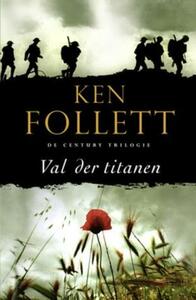Take a photo of a barcode or cover
Wow! This was magnificently written & the author's research was quite evident. I learned so much about WWI from this book, and am ashamed to admit that prior to reading, I really had no idea of how an assassination in Sarajevo drew major world powers into conflict.
slow-paced
Plot or Character Driven:
Plot
Strong character development:
No
Loveable characters:
No
While definitely not as good as Pillars of the Earth, I enjoyed this trip back to WWI, and the intricacies that surrounded the war. Helped me brush up on my history. I love how Follett tries to make his dialogues as realistic as possible.
Enjoyed the writing and characters. Felt like the sex scenes were added by editor and not originally intended by the author. They were weird and not needed.
A very engaging novel following several families through World War I, "Fall of Giants" is an epic drama piecing together characters from different walks of life. From Russian factory workers to British aristocrats, Follett has assembled a broad cast of characters to follow throughout the horrors of WWI. Follett does a good job developing the characters over the course of novel, even if the characters do sometimes come off as stereotypes. From the passionate Maud to the fervent revolution Grigori, Follett creates a diverse set of characters to illustrate different aspects of WWI.
My one major quibble is that the book could have been faced better. Sometimes hundreds of pages go by without checking in with a major character. Follett spends the bulk of the bulk on the aristocrats, which makes sense because they were the ones shifting the chess pieces in politics and battle, but I enjoyed the working class chapters just as much, if not more. I also wish Follett had developed some of the secondary characters more. I really wanted to see more of Princess Bea, outside of her cold exterior, and of Robert von Ulrich.
WWI novels can be hard to write, because trench warfare is not terribly dynamic (and because all WWI novels invariably get compared to [b:All Quiet on the Western Front|355697|All Quiet on the Western Front|Erich Maria Remarque|https://d.gr-assets.com/books/1407644834s/355697.jpg|2662852]). But Follett has done a pretty good job describing trench warfare and the battles of the Somme and the Marne from a soldier's perspective. I was a little surprised, though, that poison gas gets little mention - I would have liked to have seen more in the book about it.
Follett is extremely careful about historical details; with famed historian [a:Richard Overy|67782|Richard Overy|https://d.gr-assets.com/authors/1345328976p2/67782.jpg] as an advisor on the book, I would have expected no less. I was pleasantly surprised that some details, such as Wilson's racism or the fact that Germany really did pay little in reparations, made it into the book. Scattering such interesting tidbits made the historian in me pleased. He also does a good job describing real-life characters. His characterization of Wilson, a contradictory figure who was both an idealist and a racist, is especially nuanced. I didn't feel that the historical detail overwhelmed the story; it enhanced it.
Not a perfect book, but a highly readable one, and definitely one of the better WWI historical fiction works out there. I eagerly look forward to reading the second book in the trilogy, [b:Winter of the World|12959233|Winter of the World (The Century Trilogy #2)|Ken Follett|https://d.gr-assets.com/books/1369453743s/12959233.jpg|18116611]!
My one major quibble is that the book could have been faced better. Sometimes hundreds of pages go by without checking in with a major character. Follett spends the bulk of the bulk on the aristocrats, which makes sense because they were the ones shifting the chess pieces in politics and battle, but I enjoyed the working class chapters just as much, if not more. I also wish Follett had developed some of the secondary characters more. I really wanted to see more of Princess Bea, outside of her cold exterior, and of Robert von Ulrich.
WWI novels can be hard to write, because trench warfare is not terribly dynamic (and because all WWI novels invariably get compared to [b:All Quiet on the Western Front|355697|All Quiet on the Western Front|Erich Maria Remarque|https://d.gr-assets.com/books/1407644834s/355697.jpg|2662852]). But Follett has done a pretty good job describing trench warfare and the battles of the Somme and the Marne from a soldier's perspective. I was a little surprised, though, that poison gas gets little mention - I would have liked to have seen more in the book about it.
Follett is extremely careful about historical details; with famed historian [a:Richard Overy|67782|Richard Overy|https://d.gr-assets.com/authors/1345328976p2/67782.jpg] as an advisor on the book, I would have expected no less. I was pleasantly surprised that some details, such as Wilson's racism or the fact that Germany really did pay little in reparations, made it into the book. Scattering such interesting tidbits made the historian in me pleased. He also does a good job describing real-life characters. His characterization of Wilson, a contradictory figure who was both an idealist and a racist, is especially nuanced. I didn't feel that the historical detail overwhelmed the story; it enhanced it.
Not a perfect book, but a highly readable one, and definitely one of the better WWI historical fiction works out there. I eagerly look forward to reading the second book in the trilogy, [b:Winter of the World|12959233|Winter of the World (The Century Trilogy #2)|Ken Follett|https://d.gr-assets.com/books/1369453743s/12959233.jpg|18116611]!
I never liked history as a kid...if only they could have made it this interesting in school. Looking forward to the next book in the series.
Thought this was an interesting story; appreciate how Follet used characters from diverse backgrounds to give a fuller picture of what WWI meant to a different people by nationality. Looking forward to book 2 of this trilogy.
It was interesting and overall I enjoyed it... But it felt like the author was trying too hard to cram too many stories into one. Any one family's storyline would have been more than enough to have a fantastic story.
Generally, I liked it. I thought the interconnectedness on some (or maybe all) of the characters was a bit contrived, but it usually moved the story along so it wasn't too obnoxious. However, anyone who knows me well knows I'm just a bit of a prude, and as such I was annoyed at Follett's apparent obsession with deflowering virgins. There was way more detail than necessary dedicated to the "first time" of countless women in every station of life in several countries. Just when I thought there were no virgins left in the world, Follett produced another one! All of these encounters were thankfully consensual, but it got tedious to listen to (I listened to it on Audible, and I do think it would have been less annoying if I had been reading a hard copy or ebook and could more easily skim past these sections). As much as I was tired of listening to deflowerings, I was also annoyed that the one young man who lost his virginity was not offered the same level of minute detail, but was instead glossed over with a mere mention that it was his first time. Follett also tended to gloss over all other sexual encounters with experienced partners (including those who recently had been virgins), which only made the deflowering passages stand out all the more. Granted, I much preferred the way he handled these scenes, but where is the consistency? Either you want to give the reader every intimate detail of each dalliance, or you want to leave something to their imagination. Please, pick one! This rant likely makes it seem as though I really disliked the book, but aside from these sections I did think it was an interesting and entertaining read.
Another Ken Follett epic, this time focusing on WWI - how it started, how it grew bigger than anticipated and most of all how the world was affected by it.
As per usual, this book is enormous, but it was so fascinating and character driven that I didn't notice the length at all. I feel like I have fairly decent understanding of WWI, but I still learned so much about the ins and outs of how it started and progressed. Historical fiction is fast becoming my favourite genre for this very reason.
I quickly bonded with almost all of the characters and felt invested in not only their stories, but their relationships and ultimately their survival. And there was just the right amount of sentimentality and romance to juxtapose the harsh realities of war. Actually, on that note, probably my only criticism is that nothing all that bad did happen to the core group of characters - I expected this book to be a blood bath but it wasn't at all, which to me felt pretty unrealistic for its setting. Perhaps Follett grew too attached to his own characters? I guess book 2 and WWII will be the real test....
As per usual, this book is enormous, but it was so fascinating and character driven that I didn't notice the length at all. I feel like I have fairly decent understanding of WWI, but I still learned so much about the ins and outs of how it started and progressed. Historical fiction is fast becoming my favourite genre for this very reason.
I quickly bonded with almost all of the characters and felt invested in not only their stories, but their relationships and ultimately their survival. And there was just the right amount of sentimentality and romance to juxtapose the harsh realities of war. Actually, on that note, probably my only criticism is that nothing all that bad did happen to the core group of characters - I expected this book to be a blood bath but it wasn't at all, which to me felt pretty unrealistic for its setting. Perhaps Follett grew too attached to his own characters? I guess book 2 and WWII will be the real test....



